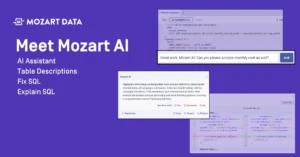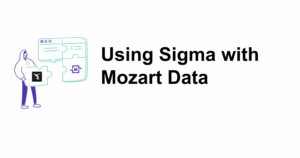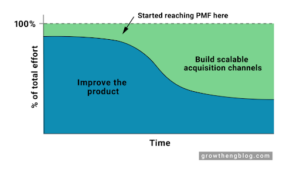Organizations that get the most from their data have something in common — strong data infrastructure.
Hiring data analysts can be incredibly valuable, and every company needs a data-driven culture. But without the right tools, there’s no way to unlock your data’s potential.

What companies really need is the modern data stack and a business intelligence (BI) tool: the collection of tools that allows you to centralize and organize your data for impactful, efficient analysis.
An ETL Tool
Standing for Extract, Transform, and Load and Extract, Load, and Transform, respectively, ETL and ELT are processes that extract the data from all of your siloed sources and move it to your warehouse. This process is also known as data ingestion.
These tools also automate the data extraction process, so your data warehouse can be synced with current data as often as it makes sense for your business.
The result is your team saves time on manual processes and more importantly, starts trusting the data. Everyone knows the data is updated as-needed and a consistent process is used to ensure it’s reliable.
A Data Warehouse
A data warehouse allows you to not just store, but also better organize and query your data.
The data warehouse is the central home where all of your data lives, and the rest of your data processes are built off of it. With data transformation, data in your warehouse can be better organized for more efficient analysis.
A Data Transformation Tool
Data transformation allows you to prepare data for efficient analysis. Transforming data is essentially changing some of the raw attributes of data, such as its format, values, and structure, to make it more accessible and prepared for efficient analysis. With transformation, you can organize your data to create a valuable universal source of truth, so all teams can confidently work with the same data.
When you have a data warehouse with multiple sources of data, you can create transform tables that include data from more than one source. This is valuable for many departments. Marketing needs to pull in data from many sources, like ad platforms, website analytics, and email tools, to analyze user behavior. To track payments, Operations might need to work with data from their billing system and CRM.
With transformation, you can also clean your data by deduplicating data, unifying conventions in a table, and removing outliers, among other tasks, to make analysis easier.
A robust transformation tool automates many of these processes, including cleaning and preparing data for analysis. You can also automatically capture a record of your data at regular intervals for auditing and history tracking, which is known as snapshotting.
Business Intelligence Tool
The ability to connect a data warehouse to a BI tool is a fundamental aspect of the modern data stack. BI tools are designed to help users analyze and visualize their data so they can easily spot trends, generate insights, and make data-driven decisions.
With a BI tool synced to your data warehouse, you can select the information you want from one or multiple tables and create visualizations like charts, simple tables, and complex graphs. Because this data should already be transformed, you don’t need to manually organize your data in the BI tool.
Visualizations of KPIs and other important business metrics can be saved to dashboards for easy access and also exported to share with colleagues or use in decks.
BI tools can be set to automatically sync with your data warehouse, so reporting can be scheduled to update without tedious manual processes.
Mozart Data provides you with a modern data stack and many additional data tools that will help you as your company scales: data cataloging, data observability, data reliability, reverse ETL, data science and machine learning. This entire suite of tools is known as the modern data platform. To learn more about building the foundation for data infrastructure and scaling your data practices with the modern data platform, read our guide here.


